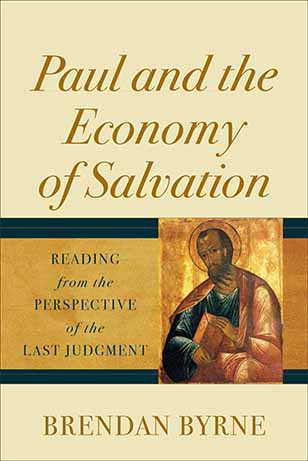 Brendan Byrne, Paul and the Economy of Salvation: Reading from the Perspective of the Last Judgment, Baker Academic, ISBN 9781540962898
Brendan Byrne, Paul and the Economy of Salvation: Reading from the Perspective of the Last Judgment, Baker Academic, ISBN 9781540962898
I came with some eagerness to read Brendan Byrne’s scholarly study of St Paul for both intellectual and personal reasons. Intellectual, because I have never been able to grasp Paul’s vision as a whole. Its coherence has been obscured by the detritus left by thousands of appeals made to his authority in later disputes. Personal, because from childhood I have sought and found God above all in nature, and came later to link that to the following of Jesus as the Son of God journeying into a far country. The strength and interconnection of these two commitments have made them durable. But more recently I have wondered whether they compose a thin gruel of the rich grain of Christian faith. They leave, not discarded, but latent so many elements of our tradition: the catastrophe of sin, the horrific nature of Jesus’ death, our salvation through his death and rising, the last judgment, and the importance of Church order, for example. Yet Paul’s letters to his communities display a passionate concern for precisely these things.
Paul and the Economy of Salvation, of course, did not offer an answer this existential question. Nor should it have. It is, however, a masterpiece of lucidity and of scholarship. Behind each sentence lies a shelf of books and a lifetime of texts worked through, and understandings argued for. As the subtitle indicates it is a reading of Paul from the perspective of the Last Judgment. Although one of many possible perspectives, it allows an authoritative and compelling presentation of Paul’s thought.
Byrne situates Paul in a strand of Jewish thought that believed God was soon to come to judge the world of sin and death. The list of those who would be found to be justified was confined to God’s chosen people, and was further confined to those who were justified by obeying God’s law in their lives.
Paul, too, initially believed that God’s judgment was imminent and would be based on obedience to the Mosaic law. He set into this framework his disruptive vision of Jesus as the Son of God through whose crucifixion salvation had come and so turned upside down Paul’s previous convictions. Jesus’ tortured death expressed God’s Judgment on a world in which sin and death reigned. But justification on the day of judgment was no longer based on obedience to the law but on faith in Jesus Christ who had saved them in his death and rising. The Spirit of Christ animating that faith generated within the community of believers a faithful way of life by which they would be saved at the Last Judgment. Followers of Jesus, then, lived in the short gap between two interlocking judgments: namely God’s definitive judgment of salvation through Jesus Christ’s death and the final judgment that would also include personal lives.
This is a dramatic picture painted in primary colours. For Paul its radical character lay in the fact that God judges the world through the tortured death of Jesus his Son. His acceptance of the horror of this death was a judgment of the catastrophic state of the world and of humanity. Set against the cost of salvation, God’s love and gift of justification were seen as correspondingly overwhelming. This life-changing vision of salvation through faith in Christ crucified and the prospect of an impending final judgement made Paul’s calling to preach all the more imperative.
The question that Byrne leaves with us is the one which I brought to the reading of his book: how to find a proper place for Paul in the vision of Christian faith. The challenge that Paul’s vision makes lies in its moral urgency. Finding God in creation and Jesus as companion and Lord fit comfortably with my own lifetime of freedom from war, disease and civil strife, of plenty and of a spacious environment. Comfortable times and reaction against an individualised understanding of sin and judgment have encouraged the view that the state of the world and of human lives is not too bad, that faith finds expression in wholeness, and that salvation is guaranteed.
We have no reason to believe, however, that the privileged conditions of our nation will persist. Nor that a sunny view of faith will remain adequate. The failure of our generation to address inequality, global warming and bitterness within and between societies seems more likely to express itself in war, hunger, a harsh environment, and a lust for power than in their opposites. Paul’s view of the world as one in which moral death reigns, of Jesus‘ crucifixion as the emblem of God’s judgment of it, and of faith in Christ’s death and rising as the impossible possibility that sparks hope and joy, may have a gravity that alone fits the times we have shaped for our grandchildren. Finding God in creation and following Jesus will surely have their place in that world, but one that will be tested by fire.